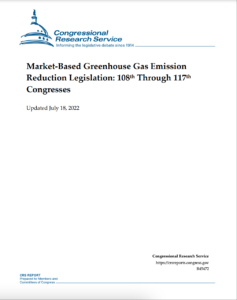Full Title: Market-Based Greenhouse Gas Emission Reduction Legislation: 108th Through 117th Congresses
Author(s): Jonathan L. Ramseur
Publisher(s): Congressional Resource Service
Publication Date: July 18, 2022
Full Text: Download Resource
Description (excerpt):
Congressional interest in market-based greenhouse gas (GHG) emission control legislation has fluctuated over the past 20 years. Market-based approaches that would address GHG emissions typically involve either a cap-and-trade system or a carbon tax or emissions fee program. Both approaches would place a price—directly or indirectly—on GHG emissions or their inputs, namely fossil fuels. Both would increase the price of fossil fuels, and both would reduce GHG emissions to some degree. Both would allow covered entities to choose the best way to meet their emission requirements or reduce costs, potentially by using market forces to minimize national costs of emission reductions. Preference between the two approaches ultimately depends on which variable policymakers prefer to precisely control—emission levels or emission prices.
A primary policy concern with either approach is the economic impacts that may result. Expected energy price increases could have both economy-wide impacts (e.g., on the U.S. gross domestic product) and disproportionate effects on specific industries and particular demographic groups. The degree of these potential effects would depend on a number of factors, including the magnitude, design, and scope of the program and the use of tax or fee revenues or emission allowance values. This report provides a comparison of the legislative proposals from the 108th through the 117th Congresses that were and are designed primarily to reduce GHG emissions using market-based approaches such as cap-and-trade or carbon tax/fee programs.
